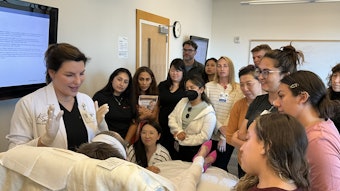
Significant interest is paid to national legislation. Professional associations often organize advocacy committees to give testimony to the U.S. Food and Drug Administration and employ lobbyists to craft and shape federal policy. But if you want to have an impact on the legislation that is most likely to affect your practice and profession, such as reimbursement rates, licensure, liability, and employee costs and benefits, you need to look a little closer to home—at state and municipal government.
It’s all too easy to focus our attention on legislation and regulations from the federal government,” says Sean W. Hadley, a Moorestown, New Jersey-based attorney active in government relations. “But the reality is that businesses are more affected by ordinances passed by their local communities than by anything that goes through—or doesn’t go through—Congress and the federal agencies.”
Municipal Matters
Local governments typically control a host of mission-critical “quality of business” issues. Among them are business licensing and expansion, the design of storefronts and building exteriors, parking, billboards and any activities that affect the environment.
An unfriendly ordinance passed in any of those areas can throw a monkey wrench into your own business engine. Consider especially the control that local governments have over roads, including their quality, their cleanliness and the placement of navigational signs making it easy or difficult for clients to find a business. Even the direction of traffic depends upon local regulations. Imagine waking up one morning to discover the street in front of your practice has been changed to a one-way conduit—in a direction not favorable to your patient base.
Business ambitions also can be stymied by local regulations. “Zoning issues are a local concern many people don’t worry about until they start to expand or make business improvements, such as installing new signs or larger and brighter windows,” says Hadley. “Then they can run into problems with a requirement to preserve structural elements or utilize certain themes or colors.”
Other issues determined at the local level include those of homelessness and social welfare. “Social services are supplemented from local funds,” says New Hampshire state senator and former Keene, New Hampshire, city councilor Jay Kahn. “There is generally a welfare office within the city to assist people who have short-term needs, and that could include housing or medical issues. Of course, the local issue with the most direct impact on citizens and business owners is property taxes.”
High property taxes can adversely affect your overhead costs, while low property taxes can adversely affect your practice if it results in a lack of infrastructure improvements. “Suppose you need improvements to the roads leading to your practice, and you were able to convince your town to pass an ordinance requiring that. You think you have accomplished your goal, but if the town budget does not allocate the requisite funds you will see no road improvements over the coming year,” says Hadley. “Without the money to fund it, an ordinance is only worth the paper it’s written on.”
Matters of State
At the state level, there are a plethora of concerns that affect both business owners and healthcare providers. “It is important for physicians, especially those who have private practices, to engage [their representatives], because a lot of the regulations affecting how they practice, how their facilities and offices are set up, licensure requirements and how health insurance is managed occur at the state level,” says Michael Katz, MD, an anesthesiologist and former Delaware state senator. “How you provide care to patients and your bottom line can be affected in a pretty significant way.”
Licensure. In aesthetics, licensing requirements for ancillary providers—including which procedures they can perform and the amount of training required to gain certification—are important issues that vary based on the state in which you practice. Licensure boards make these decisions. “Licensure boards are defined in statute and typically are comprised of people who practice in that field,” says Sen. Kahn. “They define the initial licensure requirements and recurring licensure requirements, which usually come with a continuing education requirement.”
He notes that initial licensure can be defined on a state-by-state basis or through a multi-state compact that creates common criteria for initial licensing and recertification that is recognized by all states within that compact. “In addition to educational requirements, the initial licensing requirements include how many hours of supervised practice a person needs before they can work independently with clients or patients,” says Sen. Kahn.
Reciprocity. Some states enter into reciprocity agreements in the absence of a multi-state compact. For Sen. Kahn, whose district borders both Vermont and Massachusetts, this is an important issue for licensed practitioners.
“I’ve introduced a number of reciprocity bills with surrounding states, because this is where we are most likely to see cross-border licensure concerns, particularly when we have workforce shortages,” he says. “For instance, an EMT might work three days a week in Vermont and two days a week in New Hampshire, or you might have a dermatologist who wants to open a practice in both Winchendon, Massachusetts, and Keene, New Hampshire.”
Tort Reform. Tort reform, which limits the extent of damages in liability cases, is state determined.
Reimbursement Rates. While Medicaid is a federal program, it is up to the states to decide whether they will offer Medicaid enhancement or not. “Medicaid enhancement enables a larger group of patients to use Medicaid, and it covers a broader range of services,” says Sen. Kahn.
Employment Concerns. Several issues that affect your employees and your obligations as an employer, such as minimum wage, family medical leave and insurance coverage, are also decided at the state level. While there are federal regulations, many states go beyond the federal requirements in terms of the length of leave required, minimum wage or the size of businesses affected by the legislation.
“Employers may be subject to various insurance requirements that they need to provide their employees, including unemployment insurance and family medical leave, which can be defined by the state,” says Sen. Kahn. “Some states also have—or are seeking to pass—legislation that enables businesses to form purchasing groups, so they can get better rates on employee health insurance plans.”
Employee Background Checks. Employee background checks can be beneficial in an industry where staff members have access to prescription drugs and work closely with patients. But it’s not always easy to gather up-to-date information, and some states limit the use of employee background checks. “A lot of state legislation has surfaced around doing FBI criminal history background checks, so you don’t have to search each state,” says Sen. Kahn. “You need legislation that allows the employer to request these checks, and also to set the terms for employee release, meaning the applicant needs to sign off saying they allow the FBI to release that information to you.”
Staying Abreast of Legislation
With so many issues to track, how does one stay on top of pending legislation that may affect the business or practice of medicine? One way is to take advantage of existing resources. “Most municipalities have a website,” says Marc H. Pfeiffer, assistant director at the Bloustein Local Government Research Center in New Brunswick, New Jersey. Many local agencies post their calendars and meeting agendas online, which allows you to check for upcoming topics that might impact your business.
“Your town website also may offer news feeds, enewsletters, Facebook pages or Twitter accounts,” says Pfeiffer. All such media are conduits for news about proposed regulations.
States also have websites where you can search bills by number or keyword, but the most effective means of tracking and affecting state and municipal legislation is introducing yourself to your local representatives. How do you do this? “Well, I’d be very direct,” says Sen. Kahn. “Make an appointment.”
Make Your Voice Heard
You can find the names of state and municipal representatives—as well as their emails and phone numbers—on your city and state websites. While email can feel less obtrusive, Sen. Kahn notes that email inboxes often get filled with feedback on overpoliticized issues, so emails might go unread. “I recommend making a phone call and setting up an appointment to meet the legislator personally. You can certainly email but don’t rely on email,” he says.
Another option is to get involved with your state medical or specialty association. “They typically have relationships with and methodologies on how to reach out to legislators, so they can provide a lot of support,” says Dr. Katz. “They can streamline the process of identifying the correct people—if you don’t know who your local representatives are—and also help facilitate a meeting.”
On the municipal level, you can influence your local political establishment by attending and speaking during public input at town meetings. Because physicians and other healthcare professionals are typically well respected in their communities, legislators will appreciate your efforts to engage during meetings and with them personally. “Not only are physicians typically well respected in the community, they are a good source for information and guidance on healthcare and small business issues,” says Dr. Katz.
Nancy Bocskor, a political consultant in Arlington, Virginia, recommends inviting your representatives to visit your place of business. “Let the politicians see what you do and how many people you employ and how much tax revenue you generate,” she says. “You need to be proactive in making sure they understand the value you bring to your community.”
Legislators are most influenced by their own constituents, so if you have a concern, your city councilor, state representative or state senator is the best place to start. But a second point of contact is committee chairs. “A legislator may not be familiar with either the statutes or the area related to your issue, because they’re not on that committee,” says Sen. Kahn. “Therefore, contacting a committee chair or a staff member to that committee is another way of reaching out and expressing your support or concern over issues in the legislature or issues you would like to see taken up by the legislature.”
Before a vote comes before the City Council or State House or Senate, bills go through committee, and committees allow for public testimony. “Testifying is a great way to be involved,” says Sen. Kahn. “In New Hampshire you don’t need to notify the committee in advance, you can just appear and sign in if you wish to testify.”
You can find the dates of upcoming committee hearings by tracking a bill through your state website or checking the upcoming committee agendas on your city website. “On the state level, once you track the bill and know where it is in the legislative process, you can then watch the docket, which is established a week in advance,” says Sen. Kahn.
Take an Active Role
If you want to have a more significant effect in shaping municipal or state government there is no better way than by joining the process either as a board member or by running for office yourself. Board members, such as those who serve on the state medical board and licensure board, are often a mix of political appointees and board appointees. “A professional association might name one or two members, a governor might name one or two, and legislative leadership might appoint one or two members. But this varies not only from state to state but also from board to board. Not all boards have the same makeup,” says Sen. Kahn.
If you are interested in joining a state board or municipal committee that covers your areas of expertise, building relationships with your state professional associations and local legislators is a good way to start.
Running for office does not require any special connections, but if successful, it allows you to have a significant effect on your community and profession. “There is no better way to affect and help guide policy than to be on the inside and be a legislator,” says Dr. Katz. “You have the ability to introduce and write policy at will. You can drive discussions. You can create discussions.”
When he served in the Delaware State Senate, Dr. Katz was the only medical professional in the state assembly. “So if anything involving health care came up, people would come to me to get my expertise and insight on the subject. If it was an area where I did not have expertise, I knew how to access people in the field to get the expertise we needed to formulate good legislation and make good decisions,” he says.
Dr. Katz encourages physicians and other healthcare professionals to get more involved in the political process. “This is how and where decisions are made that ultimately affect our patients. It’s also an interesting learning experience and another way to give back to the community,” he says. “At the state and local level, there is a real void of expertise on health care. And if healthcare professionals do not get involved, that void will be filled by people who have very little, if any, experience and expertise.”
Phillip M. Perry is a freelance writer based in New York City.
Image copyright Erik Socha/Pixabay; Mediamodifier/Pixabay











